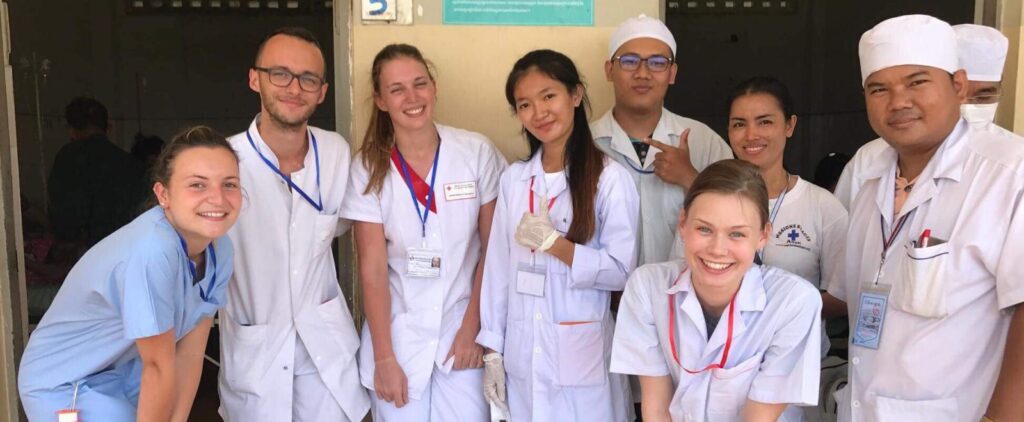Introduction
Medical internships are a pivotal component of training for aspiring healthcare professionals, providing essential opportunities to apply theoretical knowledge in real-world clinical settings. These internships typically occur during or after medical school and can last anywhere from a few weeks to several months. They encompass a variety of environments, including hospitals, clinics, and research institutions, where interns gain hands-on experience working alongside experienced medical professionals. The importance of medical internships cannot be overstated; they serve as a critical bridge between classroom education and actual patient care.

During a medical internship, students have the chance to engage in numerous clinical activities, such as taking patient histories, conducting physical exams, and assisting in medical procedures. This practical exposure not only enhances their medical knowledge but also helps develop vital skills such as communication, teamwork, and critical thinking. For instance, interns often interact directly with patients, allowing them to refine their bedside manner and learn how to convey complex medical information in an understandable way. Furthermore, by observing seasoned professionals, interns gain insights into the nuances of patient care, decision-making, and ethical considerations in medicine.
Another significant benefit of medical internships is the networking opportunities they provide. Building relationships with mentors and peers in the healthcare field can have lasting effects on an intern’s career. These connections may lead to future job opportunities, research collaborations, or recommendations for residency programs. Moreover, internships often expose students to various specialties, helping them identify their interests and preferences for future career paths. For example, an intern may discover a passion for pediatrics while working in a children’s hospital or find an affinity for emergency medicine during a rotation in the ER.
The learning curve during medical internships can be steep, and it is not uncommon for interns to face challenges. The fast-paced environment of healthcare can be overwhelming, and the responsibility of caring for patients can lead to significant stress. However, these experiences also foster resilience and adaptability, qualities that are crucial in the medical profession. Interns often learn to manage their time effectively, prioritize tasks, and navigate complex situations under pressure. These skills are invaluable, as they prepare students for the demands of residency and, ultimately, their medical careers.
Moreover, medical internships often emphasize the importance of interdisciplinary collaboration. Interns frequently work with a variety of healthcare professionals, including nurses, pharmacists, and social workers. This collaborative approach highlights the interconnectedness of healthcare and teaches interns the significance of teamwork in delivering high-quality patient care. Understanding the roles of different team members and learning how to communicate effectively with them can significantly enhance an intern’s ability to provide comprehensive care.
In addition to clinical skills and professional development, medical internships also promote personal growth. Interns often confront ethical dilemmas and witness the realities of patient care, which can be emotionally taxing yet enlightening. These experiences foster empathy and compassion, reinforcing the human aspect of medicine. Interns learn the importance of listening to patients, respecting their autonomy, and considering their perspectives in the decision-making process. This holistic approach to patient care is essential for becoming a well-rounded healthcare professional.
As medical internships become increasingly competitive, students are encouraged to take proactive steps in securing their placements. Engaging with mentors, participating in volunteer opportunities, and utilizing university career services can enhance their chances of finding suitable internships. Once placed, interns should approach their experiences with enthusiasm and a willingness to learn. By actively seeking out opportunities, asking questions, and embracing challenges, they can make the most of their internship and set a solid foundation for their medical careers.

How to Find Medical Internships
Finding proper medical internships may be difficult, but with a proper approach, it can become much simpler. Here are some effective ways through which one can find internships in the field of medicine:
1. University Resources
Leading medical schools possess strong career services that will equip you to gain an internship. Approach your academic advisor or career counselor to understand whether they have agreements with hospitals and clinics across your locality that offer internships to students from your institution.
2. Job Websites You can source many medical internships from job websites like LinkedIn, Glassdoor, and Indeed. Simply type in the keyword “medical internships” to get relevant postings. You can also set up jobs alerts for new postings.
3. Professional Organizations If you really need to find openings in the medical Internships you may want to consider becoming a member of professional organizations.
Take part in professional organizations related to your profession. Some professional organizations include the American Medical Internships or the American Association of Medical Colleges, and they may be just the best place to begin. Many such professional organizations carry job boards and other resources to help you find available internships for students.
4. Network
Communicate with professors, medical Internships and classmates. Let them know you are interested in getting a medical internship. Networking usually refers to opportunities that would not otherwise be advertised.
5. Social Media
Keep up with hospital accounts on sites such as Twitter or Facebook. Many organizations announce internship availability on their sites. You can keep current with the available positions.
6. Volunteer in Healthcare Settings
If you cannot find a formal internship, consider volunteering. It probably is not a formal program, but you can get some worthwhile experience for your time. This experience could even “pay off” when other openings come up in the future.

Preparing for Your Medical Internship
When you get your medicine internship, preparation may ensure you have a generally good experience. Here are some things you can do beforehand when preparing for your medical internship:
1. Know what’s expected of you during your internship Be clear on special goals and expectations related to your internship. The clearer you are about what to focus on, the more fruitfully would be your experience.
2. Be absolutely clear of what you want to achieve
Define what you will achieve during internship. Whether it is the development of particular clinical skills or knowledge of a discipline, you must know what you want to achieve. In that manner, you will remain focused during your internship.
3. Refresh Your Basic Skills
Review your basic clinical skills, from the patient history and physical examinations before starting your internship. In this way, you will be well prepared and have something more to put in your performance.
4. Make a Professional Resume
Create a resume that synthesizes your educational experience, coursework that is related to medicine, and any experience you have had. Use it in an application where you highlight the skills and experiences that best fit the kinds of medical internships you will be applying for.

How to Leverage Your Medical Internship
Once you land a job, apply these suggestions to maximize the experience:
1. Take initiative
Take this opportunity to learn. Do not wait for assignments to be assigned to you; volunteer to take up challenging assignments. Showing interest and the will to learn could leave an impression on your supervisors for a lifetime.
2. Build Professional Relationship
Build good relations with your supervisors and colleagues. Have conversations to know more about their work. Ask for feedback and thank them for guiding you. This could just open new avenues and also be guidance from future mentors.
3. A Reflective Journal
Keep a journal of your experience concerning the events that have been on daily basis, highlighting what you have learned and the difficulties you are facing in the process. The reflections will help you as you consider what you have learned and what needs improvement .
4. Periodical Feedback
Ask your supervisor for a feedback of your performance. Constructive criticism is very valuable for personal development; you will also know your strength and weakness .
5. Professionalism Practice
Make sure you are properly dressed, on time, and have respectful communication. Keeping your professionalism will make good impressions and establish you as a committed intern.
6. Take All Assignment Seriously
Take on all aspects of your internship, including the less glamorous ones. Office work helps know the back-end of a health facility and keeps you organized .
7. Keep Organized
Record your tasks, meetings, and learning objectives. Organization will help you keep track of how you are using your time and ensure that you are making consistent effort in the internship.
Overcoming Problems in Your Internship
An internship is quite challenging too. Here are some tips to overcome most common problems.
1. Coping with Stress
You might find the health sector environment busy and stressful. Try to find methods for managing stress, such as management of your time and practicing self-care to help you handle the stress you are likely to encounter.
2. Situations of Challenge
You will likely be exposed to difficult patients or the most challenging cases of a given illness. You should never forget to seek direction and guidance from your mentors in handling such issues.
3. Managing Responsibilities
If you are attending classes and other obligations simultaneously with the internship, create a schedule to effectively manage your time, and an effective way to cope with this is by making room for prioritized actions so as to maintain a balance.
Conclusion
Indeed, medical internships are amongst the most important pieces of education for a medical Internships. That which you will be gaining through the search for the opportunity and then in using what you are being provided with during the internship is very relevant to the building of career opportunities. Ideally speaking, an internship period should ideally be filled with networking, work skills, and learning.
Welcome this exciting phase in your career and exploit your medical internship as a launching pad to future experiences in the practice of medicine. Every experience makes you a professional healthcare provider, a healthy and confident member of the medical profession. It is through determination and the open-minded attitude that your medical internship can step out to be a revolutionary experience that leads you towards a successful career in medicine.







